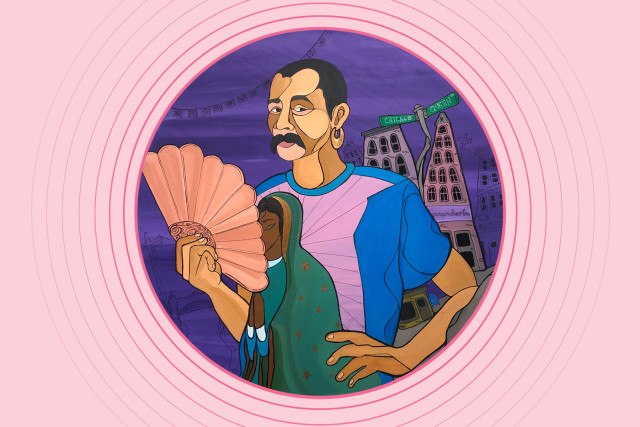
Sam Kirk Cholo/a, 2020, mixed media on wood disc, 29 x 29 inches
Fluid Gaze
September 30, 2023 – December 30, 2023
OPENING RECEPTION: Saturday, September 30, 6–8 PM. Music by DJ Anjo.
PERFORMANCE: José Villalobos: Deeply Rooted, Cultured and SIlenced, Saturday, September 30, 6:30 PM.
516 ARTS' presents Fluid Gaze, curated by Rachelle B. Pablo (Diné), which features the work of 13 artists from various creative practices and 2SLGBTQIA+ identities, presenting Indigenous, non-Indigenous, and Latinx perspectives. At a time when drag show bans and anti-trans legislation are sweeping the United States, Fluid Gaze responds to today's social climate by addressing the subtleties of gender expression through contemporary artistic practices. In these works, fluidity functions as metaphor, conveyed through a variety of mediums and range of material culture—including textiles, beaded garments, earthen materials, scrimshaw, virtual reality, and performance.
Exhibiting artists include sheri crider & Obie Weathers, III, Adri De La Cruz, Amanda Curreri & claudia hermano, Harmony Hammond, Sam Kirk, Lehuauakea (māhū mixed-Native Hawaiian Kānaka Maoli), Gabriel Maestas, Jenny Irene Miller (Inupiaq), Roin Morigeau (Bitterroot Salish Flathead Nation/French], José Villalobos, and Zefren-M (Navajo). Together, these artists invite us to consider the layers of experience and context that shape queer identities today.
The opening night reception will feature a special performance piece at 6:30pm from exhibiting artist José Villalobos, who challenges, subverts, and protests the "toxicity of machismo" culture through provocative transformations of vaquero (cowboy) iconography. Additionally, 516 ARTS has designated a Queer Zine Reading Room space in our front window bay, featuring Queer/2SLGBTQIA+ zines curated in collaboration with Wasted Ink Zine Distro—a zine hub in Phoenix, AZ. And our front desk bookshop is highlighting Queer/2SLGBTQIA+ books and more, with titles speaking to the exhibition themes provided by Self Serve, Albuquerque’s local health- and education-focused sexuality resource center.